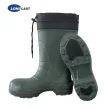What is the difference between EVA and PVC boots?
Material Composition
One of the primary differences between EVA and PVC boots is the material used in their construction. EVA (Ethylene Vinyl Acetate) is a lightweight, flexible polymer known for its cushioning properties and comfort. It’s commonly used in footwear because of its excellent shock absorption capabilities. PVC (Polyvinyl Chloride), on the other hand, is a harder plastic that is typically heavier than EVA. While PVC offers greater durability and resistance to wear, it doesn’t provide the same level of comfort or flexibility as EVA. Understanding these material differences is essential for selecting boots that meet your specific needs.
Weight and Comfort
When it comes to comfort, EVA boots generally outperform PVC boots due to their lighter weight and softer material. EVA is known for its softness and flexibility, making it a great choice for individuals who need to wear boots for long hours. It reduces foot fatigue by providing better cushioning and flexibility. PVC boots, while more durable, tend to be heavier, which can make them less comfortable for prolonged use. If comfort and ease of movement are top priorities, EVA boots are the better option for extended wear.
Durability and Wear Resistance
While EVA offers superior comfort, PVC boots are often the better choice when it comes to durability and wear resistance. PVC is a tough material that can withstand harsher conditions, making it more suitable for environments where the boots will encounter rough surfaces, chemicals, or oils. EVA boots, while durable in their own right, may not hold up as well under extreme working conditions. Therefore, if your work environment demands a more rugged and resistant boot, PVC might be the more appropriate choice.

What is the use of tempered glass and regular glass?
How Glass is Made | What is Glass Made of?
The 6 Kinds of Commercial Glass and The Purposes They Serve
4 Ways to Calculate a Discount
Waterproofing and Insulation
Both EVA and PVC boots offer good waterproofing properties, but they differ in their insulation capabilities. EVA boots typically provide better insulation due to the material’s ability to trap heat, making them more suitable for colder climates or wet environments where warmth is a concern. PVC boots, though waterproof, may not offer the same level of warmth. However, PVC boots excel in environments where exposure to water and chemicals is frequent, thanks to their resistance to cracking and degradation in such conditions.
Cost Considerations
Another key factor to consider is the cost difference between EVA and PVC boots. EVA safety boots tend to be slightly more expensive due to the comfort and lightweight properties they provide. PVC boots, on the other hand, are generally more affordable and widely available, making them a popular choice for industries where durability and cost-efficiency are paramount. When choosing between the two, it’s essential to weigh your budget against the specific features you require from your footwear.
Environmental Impact
In terms of environmental impact, EVA is considered more eco-friendly compared to PVC. EVA materials are often recyclable and contain fewer harmful chemicals during production, making them a more sustainable option. PVC production, by contrast, involves the use of more chemicals that may have a negative environmental impact. If environmental sustainability is a factor in your purchasing decision, EVA boots may be the better choice for minimizing your ecological footprint.
Conclusion
In summary, the choice between EVA and PVC boots depends largely on your specific needs and the environment in which the boots will be used. EVA safety boots offer superior comfort, insulation, and a more eco-friendly composition, making them ideal for extended wear in milder conditions. PVC safety boots, on the other hand, provide better durability, wear resistance, and affordability, making them suitable for harsher work environments. By evaluating these factors, you can make an informed decision on which type of boot best suits your requirements.
- Previous: None
- Next: None


